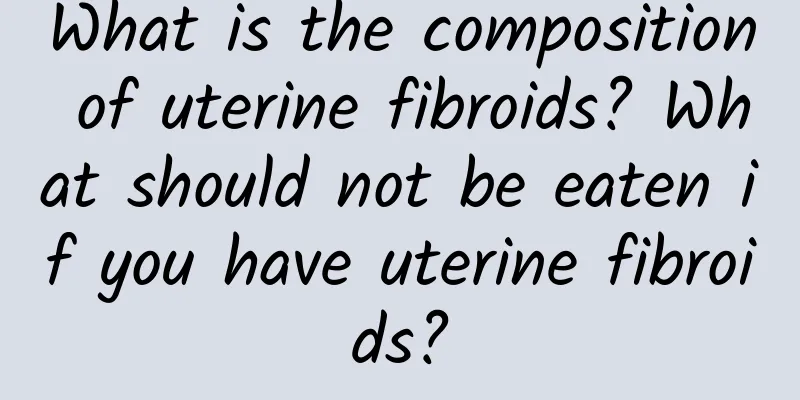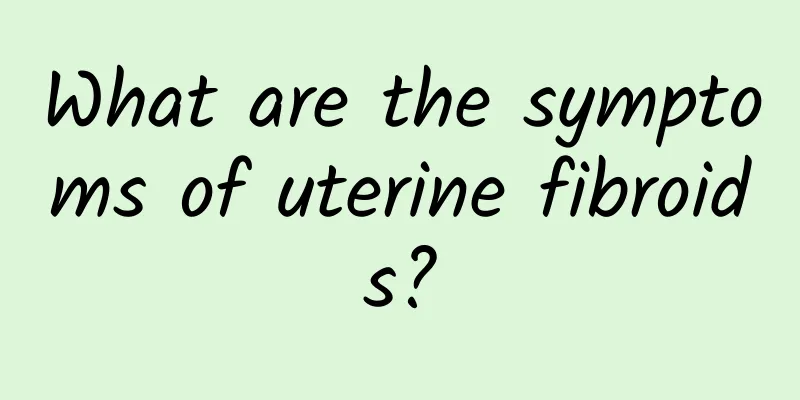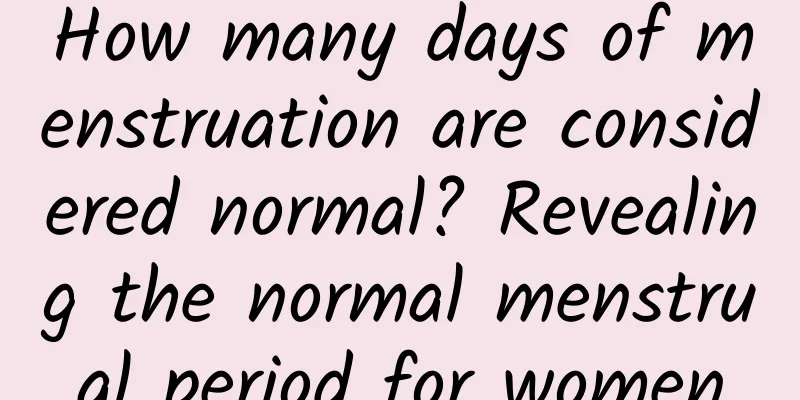What is the composition of uterine fibroids? What should not be eaten if you have uterine fibroids?

|
Uterine fibroids seriously affect women's lives and psychological conditions, and the number of fibroid patients under the age of 25 increases at a rate of 1% per year. So, what are the components of uterine fibroids? What can't you eat with uterine fibroids? Uterine fibroids, also known as uterine leiomyoma, are common benign tumors in female reproductive organ diseases. Due to its rapid growth rate, the possibility of lesions cannot be ruled out. Uterine fibroids are mainly composed of spindle-shaped smooth muscle cells and unequal amounts of fibrous connective tissue. Smooth muscle cells are uniform in size and arranged in a fence or vortex structure. The longitudinal section cells are spindle-shaped, uniform in size, and have rod nuclei; the cross-sectional cells are round or polygonal, with the round nucleus located in the center and rich in cytoplasm. Hematogenous infection is extremely rare due to infection of uterine fibroids with multiple pedicle torsion or acute endometritis. The infection is sometimes purulent, and in a few cases, abscesses form in the tumor tissue. If the diet and other living habits of uterine fibroids are improper, it is easy to relapse. The diet of uterine fibroids needs to be paid attention to, so what are the dietary taboos for uterine fibroids? Do not eat acid: Acidic foods have a solid astringent effect, which makes the blood stagnant, which is not conducive to the smooth flow and discharge of menstruation and blood. Therefore, patients with dysmenorrhea should try to avoid such foods during menstruation. Acidic foods include rice vinegar, hot and sour vegetables, pickles, pomegranates, green plums, bayberries, strawberries, carambolas, cherries, dates, mangoes, apricots, plums, lemons, etc. Do not eat spicy foods: Some patients with dysmenorrhea have more menstruation, and then eat spicy, warm, and irritating foods, which will aggravate pelvic congestion and inflammation, or cause excessive contraction of uterine muscles, aggravating dysmenorrhea. Therefore, such as pepper, pepper, garlic, onion, ginger, leek, chicken soup, durian and spicy condiments, patients with dysmenorrhea should try to eat less or not. Uterine fibroids are not terrible. Everyone can get through this disease smoothly. The following drugs have significant effects on uterine fibroids: Guizhi Fuling Pills: used for women with lumps, blood stasis amenorrhea, menstrual pain, and postpartum lochia. Guizhi Fuling Capsules: used for lumps, amenorrhea, dysmenorrhea, and postpartum lochia caused by blood stasis in women; uterine fibroids, chronic pelvic inflammatory lumps, dysmenorrhea, and endometriosis. Xiaoxiao Anquan Capsules: used for breast lumps, mammary lobular hyperplasia, ovarian cysts, and uterine fibroids caused by qi stagnation and blood stasis, with the above symptoms. |
>>: Dietary taboos for uterine fibroids? Patients with uterine fibroids cannot eat high-fat diets
Recommend
Which week is the most likely to cause miscarriage? How to prevent accidental miscarriage?
Pregnant mothers are very careful in everything t...
Experts analyze the main causes of female cervical hypertrophy
Cervical hypertrophy is a common disease, and pat...
Fat women have many hidden concerns: cancer and infertility
(Text by Dr. Zhao Qingxin, Chief Chinese Medicine...
What are the comprehensive treatments for chronic adnexitis?
What are the comprehensive treatment methods for ...
What are the obvious manifestations of early symptoms of cervical warts
The harm of cervical warts is very great. Many pa...
What are the dangers of abortion?
With the development of society, abortion can be ...
Nursing methods for patients with endometrial tuberculosis
As we all know, endometrial tuberculosis is a ver...
What medicine is good for women with irregular menstruation? This soup medicine improves irregular menstruation and works quickly
For women, they pay great attention to body condi...
Water bottles can also help you lose weight! Kenji Wu takes high school girl to "Ledong"
A survey shows that high school girls exercise fo...
What are the dangers of acute adnexitis?
What are the dangers of acute adnexitis? Acute ad...
Why does my period at the age of 50 come once every two months and why is the amount of blood heavy?
Why does my period at the age of 50 come once eve...
What causes cervical erosion in women? How should women check to find cervical erosion?
Many women have experienced cervical erosion, but...
What should we do to prevent the obesity outbreak and the concurrent depression? Doctor: Protein supplement to prevent overeating, "85210" self-help
Due to the epidemic prevention, we are staying at...
Briefly describe what is tuberculous pelvic inflammatory disease
Tuberculous pelvic inflammatory disease is a dise...
Medication guide for candidal vaginitis
Although candidal vaginitis is a common gynecolog...









